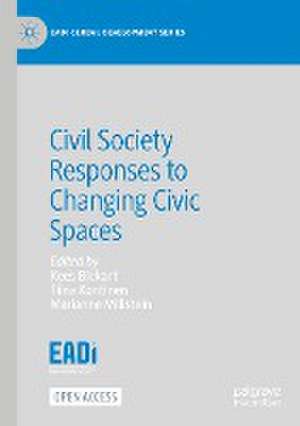Civil Society Responses to Changing Civic Spaces: EADI Global Development Series
Editat de Kees Biekart, Tiina Kontinen, Marianne Millsteinen Limba Engleză Paperback – 25 mai 2023
| Toate formatele și edițiile | Preț | Express |
|---|---|---|
| Paperback (1) | 354.54 lei 43-57 zile | |
| Springer International Publishing – 25 mai 2023 | 354.54 lei 43-57 zile | |
| Hardback (1) | 425.80 lei 43-57 zile | |
| Springer International Publishing – 25 mai 2023 | 425.80 lei 43-57 zile |
Preț: 354.54 lei
Nou
Puncte Express: 532
Preț estimativ în valută:
67.86€ • 69.93$ • 57.29£
67.86€ • 69.93$ • 57.29£
Carte tipărită la comandă
Livrare economică 03-17 martie
Preluare comenzi: 021 569.72.76
Specificații
ISBN-13: 9783031233074
ISBN-10: 3031233077
Pagini: 293
Ilustrații: XV, 293 p. 5 illus., 1 illus. in color.
Dimensiuni: 148 x 210 mm
Greutate: 0.41 kg
Ediția:1st ed. 2023
Editura: Springer International Publishing
Colecția Palgrave Macmillan
Seria EADI Global Development Series
Locul publicării:Cham, Switzerland
ISBN-10: 3031233077
Pagini: 293
Ilustrații: XV, 293 p. 5 illus., 1 illus. in color.
Dimensiuni: 148 x 210 mm
Greutate: 0.41 kg
Ediția:1st ed. 2023
Editura: Springer International Publishing
Colecția Palgrave Macmillan
Seria EADI Global Development Series
Locul publicării:Cham, Switzerland
Cuprins
Part I: Conceptualizing civil society and civic space.- 1. Introduction: Civil society responses to changing civic spaces.- 2. Interrogating civic space: Applying a civic-driven change perspective.- 3. Repertoires of the possible: Citizen action in challenging settings.- Part II: Contextual dynamics of civic space.- 4. Philanthropy during Covid-19 emergency: Towards a postcolonial perspective?.- 5. Sandwiched? Sri Lankan civic space amidst a repressive regime and a pandemic.- 6. Negotiating CSO-legitimacy in Tanzanian civic space.- 7. Spaces for peace in Mitrovica, Kosovo: Women’s voices for change.- 8. The Algerian Hirak: Civil society and the role of artists in a civic space under pressure.- 9. Constrained humanitarian space in Rohingya response: Views from Bangladeshi NGOs.- Part III: Global connections and local civic space.- 10. Advocacy in constrained settings. Rethinking contextuality.- 11. The changing Amazonian civic space: Where soy meets resistance.- 12. Local civilsociety initiatives for peacebuilding in North-East Congo.- 13. Conclusions: Spaces of hope and despair?.
Notă biografică
Kees Biekart is Associate Professor at the International Institute of Social Studies (ISS) of Erasmus University (The Netherlands). He focuses on social movements, NGOs, civil society, civic-driven change, and participatory action research.
Tiina Kontinen is Associate Professor in International Development Studies at the University of Jyväskylä (Finland), where she leads a research group on Citizenship and Civil Society in Development. She has published on civil society, NGOs, and North-South partnership and has led various projects with global research teams.
Marianne Millstein is Senior Researcher at the Norwegian Institute of Urban and Regional Research (NIBR), Oslo Metropolitan University (Norway). She has published on urban politics, governance and planning, civil society, and citizenship.
Textul de pe ultima copertă
This open access book contributes to thriving debates in academic as well as professional circles about the role of civil society in shrinking civic spaces, rising authoritarianism and right-wing populism, conflicts, fragile states, and most lately, the global COVID-19 pandemic. This is one of the first books to address the implications of changing civic spaces for civil society organizations worldwide. It offers a unique overview of how social movements and civil society groups in very different settings are responding to state-imposed restrictions of basic civic freedoms. The authors are all experts in the field, and their analyses are based on original and onsite research. This unique book also contributes to a better understanding of the conceptualizations and practices of civil society. It is of keen interest to academic scholars, students, civil society practitioners, and policy makers in the field of international development research and civil society action.
Kees Biekart is Associate Professor at the International Institute of Social Studies (ISS) of Erasmus University (The Netherlands). He focuses on social movements, NGOs, civil society, civic-driven change, and participatory action research.
Tiina Kontinen is Associate Professor in International Development Studies at the University of Jyväskylä (Finland), where she leads a research group on Citizenship and Civil Society in Development. She has published on civil society, NGOs, and North-South partnership and has led various projects with global research teams.
Marianne Millstein is Senior Researcher at the Norwegian Institute of Urban and Regional Research (NIBR), Oslo Metropolitan University (Norway). She has published on urban politics, governance and planning, civil society, and citizenship.
Kees Biekart is Associate Professor at the International Institute of Social Studies (ISS) of Erasmus University (The Netherlands). He focuses on social movements, NGOs, civil society, civic-driven change, and participatory action research.
Tiina Kontinen is Associate Professor in International Development Studies at the University of Jyväskylä (Finland), where she leads a research group on Citizenship and Civil Society in Development. She has published on civil society, NGOs, and North-South partnership and has led various projects with global research teams.
Marianne Millstein is Senior Researcher at the Norwegian Institute of Urban and Regional Research (NIBR), Oslo Metropolitan University (Norway). She has published on urban politics, governance and planning, civil society, and citizenship.
Caracteristici
This book is open access, which means that you have free and unlimited access Addresses the implications of changing civic spaces for civil society organizations worldwide Contributes to a better understanding of the conceptualizations and practices of civil society Contextualizes how the book resonates to current global trends and research debates concerning democracy and civic space









